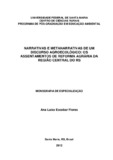| dc.contributor.advisor | Link, Dionisio | |
| dc.creator | Flores, Ana Luiza Escobar | |
| dc.date.accessioned | 2019-03-29T12:25:31Z | |
| dc.date.available | 2019-03-29T12:25:31Z | |
| dc.date.issued | 2012-04 | |
| dc.date.submitted | 2012 | |
| dc.identifier.uri | http://repositorio.ufsm.br/handle/1/16002 | |
| dc.description | Monografia (especialização) - Universidade Federal de Santa Maria, Centro de Ciências Rurais, Curso de Especialização em Educação Ambiental, EaD, RS, 2012. | por |
| dc.description.abstract | This paper addresses some main thoughts and ideas that built Western thought about the concept of nature, paving the way for reflection on the practice of agroecology from the roots of the current thinking, identifying the philosophical and epistemological concept that grounds, contemporaneously, the human / environment / nature relationship, such as knowing its evolution. It rescues the emergence of concepts such as sustainability, sustainable agriculture and agroecology in perception and speech of different social actors, and also positive experiences to build knowledge networks in institutional research and extension to farmers for agrarian reform settlers. Finally some assumptions suggest the possibility of a critical environmental education, where the importance of the processes of planning of settlements, considering the local situation as a starting point (Search of Reality), the participation of social actors and the adoption of participatory methodologies in the perspective of systems thinking and a complex view of reality, that which transcends the grand narratives, which suggests the empowerment of the subjects of discourse. It investigates from the documentary analysis, semi-structured interview, informal conversation and decoding of images, narratives of the subjects. It aims to identify the possible mediators involved in the processes for Environmental education, as well as perceptions that farmers have settled on the thematic environment, nature, agroecology, ecology and sustainability and, finally, makes suggestions and actions that will contribute in discussions the importance of responsible management of the same territory. | eng |
| dc.language | por | por |
| dc.publisher | Universidade Federal de Santa Maria | por |
| dc.rights | Acesso Aberto | por |
| dc.rights | Attribution-NonCommercial-NoDerivatives 4.0 International | * |
| dc.rights.uri | http://creativecommons.org/licenses/by-nc-nd/4.0/ | * |
| dc.subject | Territórios de discursos | por |
| dc.subject | Agroecologia | por |
| dc.subject | Assentamentos rurais | por |
| dc.subject | Educação ambiental | por |
| dc.subject | Speeches territories | eng |
| dc.subject | Agroecology | eng |
| dc.subject | Rural settlements | eng |
| dc.subject | Environmental education | eng |
| dc.title | Narrativas e metanarrativas de um discurso agroecológico: os assentamentos de reforma agrária da região central do RS | por |
| dc.title.alternative | Narratives and metanarratives of an agroecological speech: the settlements of the land of the central region of RS | eng |
| dc.type | Trabalho de Conclusão de Curso de Especialização | por |
| dc.degree.local | Polo de Agudo, RS, Brasil | por |
| dc.degree.specialization | Educação Ambiental, EaD | por |
| dc.description.resumo | Este trabalho aborda alguns pensamentos e idéias-chave que construíram o pensamento ocidental acerca da concepção de natureza, abrindo caminho para a reflexão sobre a prática da agroecologia a partir das raízes do atual pensamento, identificando as concepções filosóficas e epistemológicas que fundamentam, contemporaneamente, a relação humano/ambiente/natureza, bem como conhecer sua evolução. Resgata o surgimento de noções como sustentabilidade, agricultura sustentável e agroecologia na percepção e discurso de diferentes atores sociais e, também, de experiências positivas de construção de conhecimentos em redes institucionais de pesquisa e extensão junto aos agricultores assentados pela Reforma Agrária. Por fim aponta alguns pressupostos na possibilidade de uma Educação Ambiental crítica, onde a importância desta nos processos de planejamentos dos assentamentos, considerando a realidade local como ponto de partida (Pesquisa da Realidade), a participação dos atores sociais e a adoção de metodologias participativas sob a perspectiva do pensamento sistêmico e de uma visão complexa da realidade, esta que transcende as grandes narrativas, o que sugere o empoderamento dos sujeitos de discursos. Investiga a partir da análise documental, entrevista semi-estruturada, conversa informal e descodificação de imagens, as narrativas dos sujeitos de discursos. Objetiva identificar os mediadores envolvidos nos possíveis processos de Educação Ambiental, bem como as percepções que os agricultores assentados possuem sobre as temáticas meio ambiente, natureza, agroecologia, ecologia e sustentabilidade e, por fim, propõe sugestões e ações que venham a contribuir nas discussões sobre a importância da mesma na gestão responsável do território. | por |
| dc.publisher.country | Brasil | por |
| dc.publisher.initials | UFSM | por |
| dc.subject.cnpq | CNPQ::CIENCIAS HUMANAS::EDUCACAO | por |
| dc.publisher.unidade | Centro de Educação | por |



